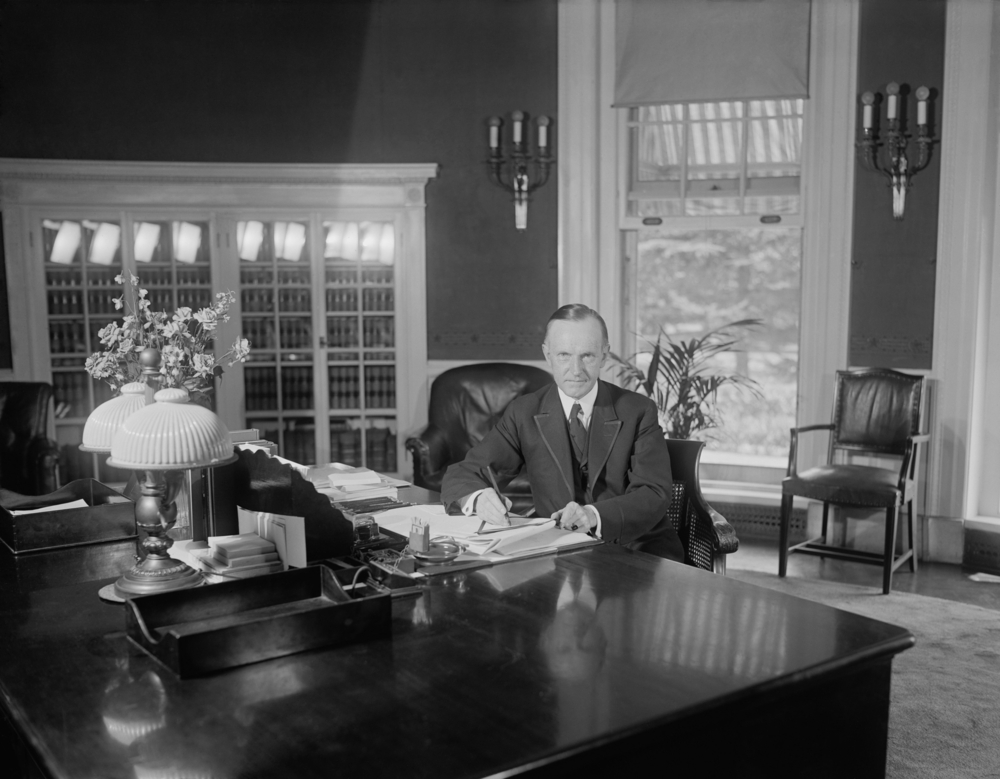Historical comparisons rarely offer definitive guides to the present. Such juxtapositions, however, can reveal ways in which conditions from the past persist into the present, thus providing a reminder of the consistency of history. Comparisons can also show how present policies and attitudes may have diverged from valuable beliefs or traditions that should be recovered.
The 1924 presidential election presents an illuminating reference for the election about to occur a century later. In 1924, Republican Calvin Coolidge ran against John Davis, a Wall Street lawyer nominated after a record 103 ballots by a Democratic Convention in disarray. Coolidge’s landslide victory that year led to arguably the most successful conservative administration in modern history, rivalled only by President Reagan’s first term. However, with the intervention of the Great Depression in 1929 and World War II in 1941, it would take nearly 60 years for American political conservatives to again find their footing.
The two-term presidency of Theodore Roosevelt had already introduced progressive policies into the Republican Party and the national political discourse. This progressivism would later increase in radicalism and strongly influence the presidency of Woodrow Wilson. Under Wilson, progressives pushed for higher taxes, an enlarged federal government, and increased administrative agency regulation over a wide swath of society. Occurring alongside America’s entry into World War I, this progressive activism steadily drained America of energy, eventually leading to Warren G. Harding’s call for a “return to normalcy” in 1920, when Coolidge ran as Harding’s vice-presidential candidate.
The Harding-Coolidge ticket sought to return peace, prosperity, and normalcy to a country that had undergone much tumult during Wilson’s presidency. After years of progressive reforms that sought to change the relationship between citizens and their government, an influenza epidemic that killed 700,000 Americans, and outbreaks of terrorism and urban violence often prompted by socialist and anarchist agitators—all capped off by a President Wilson who remained hidden from the public after suffering a debilitating stroke—Americans felt rudderless in a stormy sea of unwanted change. Harding-Coolidge won with 60.4% of the vote.
Although progressives themselves demanded dramatic changes in American life and politics, they simultaneously punished other dissenters. Using the Sedition Act to imprison political dissidents, for example, Wilson’s administration had displayed an oppressive indifference to individual liberties. Seeking to bring healing and harmony back to American society, Coolidge, now president after Warren Harding’s sudden death in 1923, pardoned the protestors convicted under the Act. Though he did not share the beliefs of those convicted protestors, neither did he believe in punishing dissenting political beliefs.
In 1924, Coolidge sought the presidency on his own merits, and ran such a successful peace and prosperity campaign, returning to the stabilizing and unifying principles of the past, that progressive Republicans bolted the party. Since the Democratic Party was also seen as too conservative, the progressives formed their own party, which under Senator Robert La Follette carried only the state of Wisconsin. A public slogan opposing the progressives was “I prefer Coolidge to Chaos.” Even Theodore Roosevelt described La Follette as “a most sinister enemy of democracy.”
Subsequently, progressives would drift on the political margins until they found a home in Franklin Roosevelt’s New Deal. This progressive strain would eventually embed itself in the Democratic Party, later manifesting as the wokery of the 2020s.
Republicans triumphed in 1920 and 1924 in part because the public had become disillusioned by high-minded progressive promises, largely unfulfilled, of a bright new world through government action. Coolidge’s call for a return to common sense in government reflected a critique of unproven, experimental progressive schemes.
Coolidge’s opposition to progressivism was rooted in his view of democracy. Progressivism, he argued, had often resulted in “autocratic methods of government.” Instead of government agency experts determining the shape and nature of society, according to Coolidge, the people acting in their collective private capacities should make such determinations and then call on government to enact whatever legislative programs were desired.
“Don’t hurry to legislate,” was the advice Coolidge had often given to the Massachusetts legislature during his years as governor. To Coolidge, the role of government was not so much to run social affairs as to help society run itself. Coolidge warned against the progressive rush to enact new laws; instead, he believed that the solutions to many of the nation’s difficulties depended ultimately “on the character and moral force of the nation.” This view of democracy, however, would gradually weaken amid the rapid growth of the administrative state in the wake of the New Deal.
Besides combatting progressive excesses, Coolidge’s 1924 campaign also addressed the issue of immigration. During the Wilson presidency, immigration had exploded. When the war ended and the economy went into a downturn, the continued wave of immigration threatened the jobs of American workers. The issue was not legal versus illegal immigration, for there were no advocates for “open borders” or lawless immigration. The issue was simply the appropriate levels of immigration given the state of the American economy.
Coolidge stood for lower levels of immigration so as to protect American workers. This was not a call for permanently lower immigration, only a recognition that for as long as jobs remained threatened in the wake of World War I, American workers should be protected. Coolidge took the same approach with tariffs, which he argued were necessary to protect American jobs jeopardized by all the cheap goods being exported by war-torn Europe.
Contrary to Wilson, Coolidge saw his role not as world leader but simply as an elected American president, concerned first and foremost with the welfare of the nation. He opposed Wilson’s internationalism, which he feared would entangle the United States in foreign crises beyond America’s control. Coolidge was not blindly isolationist; in fact, he worked hard to achieve international arms-limitation agreements. But he was careful about preserving America’s national sovereignty from international agreements and organizations, like the League of Nations, that could drag the country into unknown commitments.
The America First message of the 2024 Republican platform echoes the Coolidge belief that the United States government owes its primary duty to the citizens who elected that government.
While numerous consistencies exist between the 1924 and 2024 presidential campaigns, one stark difference is the approach to government debt. Coolidge opposed debt and placed utmost importance on decreasing the debt compiled by the Wilson administration. To Coolidge, decreasing debt was not just a hope or a political slogan. Indeed, not since the Coolidge presidency has the federal government actually reduced its nonmilitary expenditures in absolute terms.
The veterans’ bonus controversy reflects Coolidge’s courageous commitment to controlling debt. Facing the economic downturn in America upon returning from combat service in Europe, veterans began calling for “bonus” payments that would better compensate them for their military service. This was a politically popular demand, made by hundreds of thousands of veterans who had served their country. Members of Congress quickly acceded to these demands in 1924, even though there were no budgeted funds. Adhering to his commitment to reduce the debt, Coolidge vetoed the veterans’ bonus legislation. Coolidge argued that the budget must be kept in line and that the interests of one group could not preempt the nation’s welfare. In answer to the American Legion’s spirited opposition to his veto, Coolidge declared that “patriotism which is bought and paid for is not patriotism. … Service to our country in time of war means sacrifice—it is for that reason alone that we honor and revere it.” Coolidge stuck to this position, even at the risk of losing the presidential election later that year.
Coolidge’s views on debt coincided with his views on politics as reflecting and reinforcing the character of the nation. “Thrift and industry” and “work and save” were Coolidge’s stock phrases. To Coolidge, an effective and enlightened democracy depended on the self-restraint of citizens and their representatives. Similarly, he defined his role as president in terms of constitutional restraint: his executive powers included only those clearly outlined in the U.S. Constitution. According to Coolidge, the Constitution did not authorize the president to intrude into areas that belonged to other branches of government or to private society. This political humility restrained Coolidge throughout his presidency from attempting to expand his executive powers in ways that so many of his successors would later do.
This view of restraint also applied to the process of democratic governance. To Coolidge, government could not cure every ill, and legislation could not fix every problem. Individuals and society had to assume responsibility for addressing all those problems that could be addressed outside the realm of government.
In sum, remembering the 1924 campaign helps promote an understanding that not all contemporary issues are unprecedented. It also helps illustrate how recent generations have drifted away from the bedrock principles that made Calvin Coolidge’s administration the success it was. Let’s hope it has set a precedent that someone will emulate.

